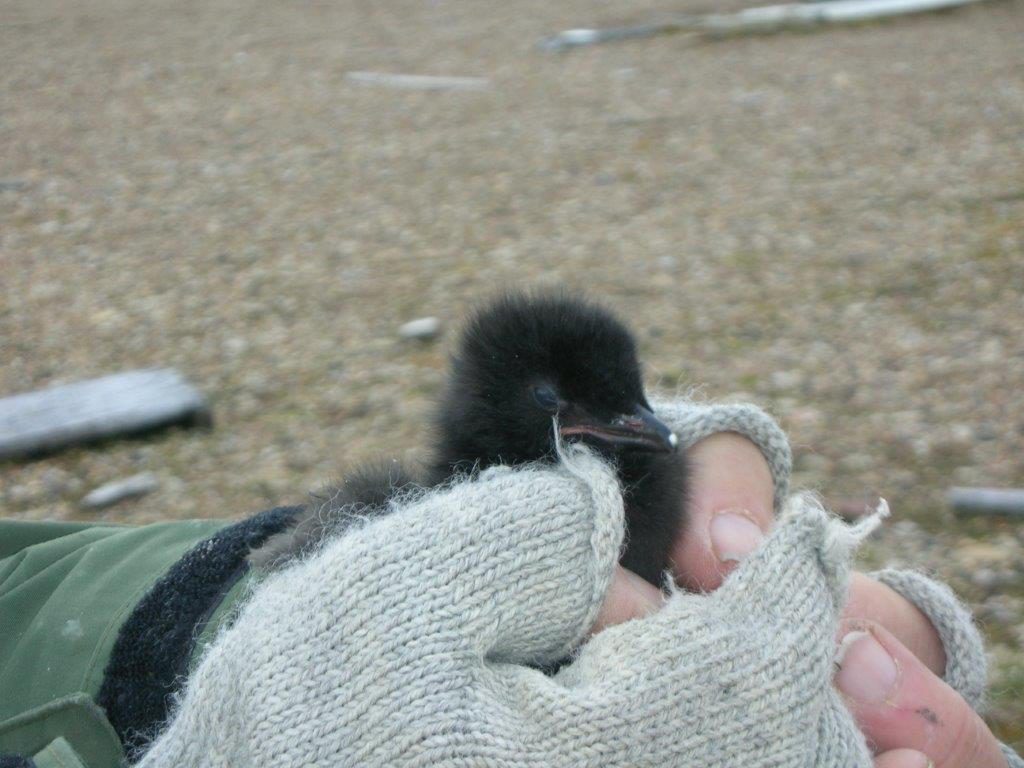August is the rainy month of our field season, and the first day of the month was tough for us. During our morning nest checks, it wasn’t easy to keep our hands warm in a steady soaking rain, coupled with a windchill of 27 degrees Fahrenheit.
The fingerless gloves I wear daily in the summer are a godsend for handling eggs and nestlings–wet fingerless gloves at temperatures near freezing are only slightly better than no gloves at all.

The cold, wind and rain (and numb fingers) were made more bearable by the fact that our nest checks found hatching high at nests that are still being attended. All the chicks seem to be doing well in their first few days.
After hatching, guillemot nestlings are incubated by their parents for about a week. The parent’s defeathered brood patch (present in both males and female parents) warmed the egg for the last month and now provides heat to the nestlings, reducing their caloric needs.
In a breeding season where good news about the Cooper Island guillemot colony is at a premium, there are a good number of nestlings being warmed by their parents in the remaining active nests. Nearly 40 chicks are currently in the colony with a few more eggs expected to hatch soon. While overall hatching success will be low with so many nests having eggs abandoned shortly after laying, hatching success for nests that have been regularly attended will be high.
Given the high overwinter adult mortality and decrease in pairs and number of birds that did not lay or incubate eggs, this has not been a good year for the colony. But that does not mean it is a bad year for all pairs – and focusing on the success of individual nests provides a sense of optimism.
Some parents will be able to fledge one or even two chicks this year, though it will certainly not be as easy as it was for parents breeding here in the 70s and 80s when sea ice was just offshore and prey abundant. The nestlings hatching now (at 35 grams) will have to undergo a 10-fold increase in weight before flying off after five weeks of being fed by their parents. Their growth and survival will depend on the abundance and availability of fish in the adjacent Arctic Ocean.
August has always been the month when the warming Arctic has had the most effect on the productivity of the Cooper Island Black Guillemot colony. We are hoping conditions this August will allow many of the newly hatched chicks to be flying out to sea later this month – and returning in a few years to breed and maintain the colony.
Field Team Update
Drew Sauve and Thomas Leicester arrived on the island on July 22.
Drew completed a master’s at Queen’s University in Kingston Ontario this past spring analyzing heritability and plasticity in timing of egg laying in the Cooper Island Black Guillemots. He is continuing for a doctorate that expands on his master’s and includes genetic analysis of the individuals breeding on Cooper. Our daily fieldwork includes collecting feathers and other tissue for him to analyze in the lab.
Thomas is an undergraduate I met through my collaboration with Kyle Elliott of McGill University. This is Thomas’s first ornithological fieldwork and it’s been enjoyable to explain the data gathering techniques and what the data sets tell us about both the guillemots and the Arctic environment.


Having Drew and Thomas on the island has provided the personnel needed to capture more birds as they roost next to the pond in the middle of the colony. Using mats with monofilament nooses we have been able to catch and give color bands to 20 birds that fledged from Cooper Island but have yet to join the breeding population. Two of these birds were nest mates in 2015, fledging from nest I-7, which their male parent still occupies, alone because their female parent was one of the birds that died this past winter. She has not been replaced by a new recruit this year.
– George